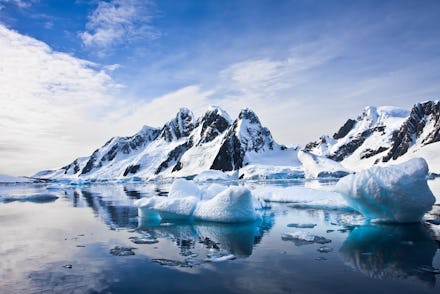Luxury cruise liners are now taking to the vast puddle of melt that once was the Arctic

Humans have so thoroughly fucked up the planet that luxury cruise ships can now glide through the once-unnavigable Arctic — because so much of it has melted.
For less than $22,000, you too can enjoy a Crystal Serenity cruise across the Arctic, through the Bering Strait.
The 820-foot ship departed Anchorage, Alaska, on Tuesday for its scheduled 32-day trip north of Canada and through the Northwest Passage, one of the most remote places in the world.
The Arctic is particularly susceptible to the consequences of climate change. "Climate change is faster and more severe in the Arctic than in most of the rest of the world," the World Wildlife Fund explains. "The Arctic is warming at a rate of almost twice the global average."
Sea ice, which supports the region's marine ecosystem, will, within a generation, completely melt during the summer, according to predictions. While ice and snow reflect energy from the sun, water and rocks absorb it, further warming the region.
Objections to the ostentatious voyage are twofold: Some fear it is logistically dangerous and parts of the route are too remote to easily access, should an emergency arise. Others see it as profiting off a global catastrophe. Rather than diverting resources to preserving the Arctic, private industry seeks to traverse it.
"If the entire ship — all 1,000 passengers, all 600 crew — require search and rescue, for instance, if the ship sinks, then that would actually break the Canadian search-and-rescue system," Michael Byers told CBC News. Byers is the Canada research chair in global politics and international law and professor at the University of British Columbia.
"They would not be able to get to those people and retrieve them in time," Byers added.
"This is a complex operation in a very environmentally sensitive and frankly navigationally difficult area, and the weather is incredibly treacherous there, logistics very difficult to deal with," Adm. Charles D. Michel, the vice commandant of the U.S. Coast Guard, said, according to the New York Times.
Then, there're the optics. "[The cruise is] just so big and in your face, and everybody's perception of the Arctic is so fragile, remote and untouched," Patrick T. Maher, who co-edited Cruise Tourism in Polar Regions said, the New York Times added.
Crystal Serenity insists the operation is a "safe," and well planned one.
But Michel remained cautious: "I don't want a repeat of the Titanic."
Fair enough.